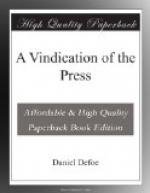A Vindication is made up of three clearly marked sections: in the first the author vindicates the usefulness of writing; in the second he discusses the usefulness—it would be more exact to say the harmfulness—of criticism; in the third he expatiates upon the qualifications of authors. One may admit at once the comparative worthlessness of the pamphlet as a contribution to criticism or critical theory. Defoe’s comments upon specific writers are thoroughly conventional and commonplace, as may be seen from a glance at his remarks about Milton, Chaucer, Spenser, Shakespeare, and others on p. 12.
Of more interest is his very high praise of Dryden, “a Man for Learning and universal Writing in Poetry, perhaps the greatest that England has produc’d” [p. l5], and his comment upon the critical detraction from which he suffered. He compares Pope, interestingly enough, with Dryden, remarking that Pope ("a Person tho’ Inferior to Mr. Dryden, yet speaking Impartially has few Superiors in this Age”) also is persecuted by envy; and he has generous praise for that poet’s translation of Homer. One may note that Defoe avoids the shortcomings of the critics whom he condemns for judging according to party. He distributes his praise indiscriminately between Whig and Tory writers. In short, his essay hardly does more than confirm the critical commonplaces of the time and attest to the catholicity of the author’s taste.
Of particular interest for students of Defoe is the paragraph [p. 2l] in which Defoe defends the hack-writers who must write for subsistence. One should not expect their writings, which are necessarily numerous, to be as correct and finished as they might be. After comparing their pens to prostitutes because of their venality, he claims, in a half-ironic tone, for both authors and booksellers the liberty of writing and printing for either or both sides without ignominy. After all, they must write and print to live. Such practice is certainly, he observes, no more unjust or disreputable than other ways of gaining wealth such as one finds in Exchange-Alley.
This paragraph gains point when one remembers that Defoe had served both Whig and Tory governments. In 1718, as letters written to Lord Stanhope in that very year testify, he was engaged in the perhaps dubious business of masquerading as a Tory, while actually in the service of the Whig ministry, to take the “sting” out of the more violent Tory periodicals; and he was much concerned with the danger of his ambiguous position. In December of 1717 he had been identified as a writer for Mist’s Weekly Journal, the leading Tory paper, and was subjected to growing attacks in the Whig press. One can hardly doubt that this paragraph is a thinly veiled defense of his own practice as a professional journalist.




